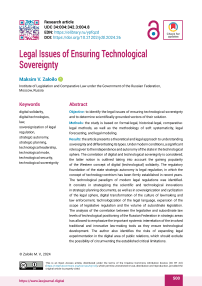Legal Issues of Ensuring Technological Sovereignty
Автор: Zaloilo M. V.
Журнал: Journal of Digital Technologies and Law @lawjournal-digital
Рубрика: Государство и право. Юридические науки
Статья в выпуске: 2 (3), 2024 года.
Бесплатный доступ
Objective: to identify the legal issues of ensuring technological sovereignty and to determine scientifically grounded vectors of their solution. Methods: the study is based on formal-legal, historical-legal, comparative-legal methods, as well as the methodology of soft systematicity, legal forecasting, and legal modeling. Results: the article presents a theoretical and legal approach to understanding sovereignty and differentiating its types. Under modern conditions, a significant role is given to the independence and autonomy of the state in the technological sphere. The correlation of digital and technological sovereignty is considered; the latter notion is outlined taking into account the gaining popularity of the Western concept of digital (technological) solidarity. The regulatory foundation of the state strategic autonomy is legal regulation, in which the concept of technology-centrism has been firmly established in recent years. The technological paradigm of modern legal regulations was identified. It consists in strategizing the scientific and technological innovations in strategic planning documents, as well as in sovereignization and cyclization of the legal sphere, digital transformation of the culture of lawmaking and law enforcement, technologization of the legal language, expansion of the scope of legislative regulation and the volume of subordinate legislation. The analysis of the correlation between the legislative and subordinate law levels of technological positioning of the Russian Federation in strategic areas has allowed to emphasize the important systemic interrelation of the involved traditional and innovative law-making tools as they ensure technological development. The author also identifies the risks of expanding legal experimentation in the digital area of public relations, which should exclude the possibility of circumventing the established critical limitations. Scientific novelty: the work forms a theoretical and legal model of ensuring technological sovereignty, which is of strategic importance for the preservation of the Russian Federation sovereignty in its classical understanding as the main and most important feature of the state. Practical significance: the results can be used in law-making activities of public authorities to create legal mechanisms for research, development and implementation of critical and end-to-end technologies and the production of high-tech products based on them in order to ensure national security of the Russian Federation.
Digital solidarity, digital technologies, law, sovereignization of legal regulation, strategic autonomy, strategic planning, technological leadership, technological mode, technological security, technological sovereignity
Короткий адрес: https://sciup.org/14130865
IDR: 14130865 | УДК: 34:004:342.3:004.8 | DOI: 10.21202/jdtl.2024.26


